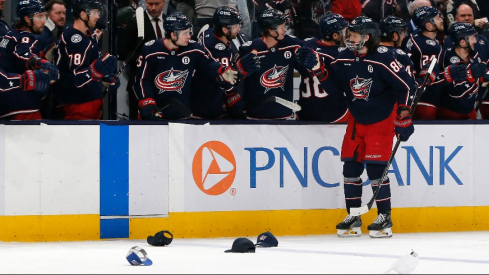Ryan Dzingel presents the Blue Jackets with an intriguing scenario.
We all know the story of Columbus going "all in" at the trade deadline in February, bringing in All-Star center Matt Duchene and 20-goal scorer Ryan Dzingel from the Ottawa Senators. An adjustment period followed for both players.
During the remaining regular season games, Duchene struggled (by his standards) registering 12 points in 23 games. Dzingel also recorded 12 points, but did so in two fewer games, but this was a bright look for a third-liner who had lower expectations than Duchene.
When the Blue Jackets brought in Dzingel, it seemed like a no-brainer that the club would try and persuade the 27-year-old into staying in Columbus for the long run. He has now scored 23-plus goals in the past two seasons and set a new career high with 58 points in 2018-19.
In the playoffs, though, the script was flipped.
Duchene had a breakout performance and was a point-per-game player. His 10 points were second-most on the Blue Jackets, behind only Artemi Panarin.
Dzingel, on the other hand, had a postseason to forget. He had one goal (no assists) in nine games. He was a healthy scratch in Game 2 of the Blue Jackets' second-round series against the Boston Bruins, and then, played only 5:15 upon returning to the lineup in Game 4.
Dzingel averaged more than 14 minutes per game in the regular season with Columbus, but was dropped to 11 minutes per game during the playoffs. His ability to drive play in the postseason was weak, sporting a mediocre 42.9 CF% that was one of the lowest among players who appeared in nine or more playoff games.
His attitude in the playoffs was...interesting. There was visible frustration. His game wasn't translating well as he tried to square off with the tough third and fourth lines of the Tampa Bay Lightning and Bruins – likely the two best teams in the league. And after being scratched in the Bruins series, well, he wasn't delighted:
#CBJ Ryan Dzingel walked quickly out of the dressing room, declining to speak with media. Nothing to say,he said, without breaking stride.
— Aaron Portzline (@Aportzline) April 27, 2019
Appears Wennberg is in for Dzingel, but nothing official from the club.
Initially, Dzingel seemed publicly excited about the possibility of staying with the Blue Jackets long-term. In his exit day interview on May 8, though, his tone sounded a little more uncertain of his future than normal.
"It takes a little while to think about everything and assess everything, but it was a lot of fun and I had a fun ride being here for sure."
We don't want to make any assumptions, but it seemed like Dzingel was still carrying a bit of that postseason frustration. The questions he was asked weren't the most sympathetic, but he also reiterated multiple times that he hadn't thought in any way about his future plans.
Dzingel is coming off a two-year, $3.6 million contract ($1.8 million AAV) that he signed with the Senators. Playoff performance aside, after putting up 97 points over the past two seasons, it would make sense that Dzingel is looking for a much bigger payday.
Next season, Dzingel could certainly be a valuable third or fourth line winger for the Blue Jackets, and maybe a top-six player if he can find chemistry and be consistent. The big question, though, is whether the Blue Jackets are willing to make the financial investment to keep Dzingel. He could command up to $4 million annually on the free agent market, most certainly on a multi-year deal.
One of the reasons Jarmo Kekalainen may be hesitant to do that? The Blue Jackets have young talent coming up through the pipeline in Eric Robinson, Alexandre Texier and Emil Bemstrom. Would it make more sense to invest in those three and let Dzingel walk?
It may depend on what happens with Matt Duchene and Artemi Panarin. Should the Blue Jackets keep both, they'll have a smaller bank to work with, and less need for Dzingel. Should one or both walk, then more money comes available and Dzingel's potential value rises.


